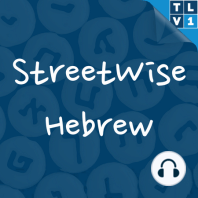7 min listen

#164 The Ruthless Israeli Line: How to Hold Your Own
#164 The Ruthless Israeli Line: How to Hold Your Own
ratings:
Length:
8 minutes
Released:
Apr 11, 2017
Format:
Podcast episode
Description
It happens all the time. Someone cut you in the line at a Tel Avivi market, just stepped right in front. What do you say to put them back in their place? That is, back behind you in the queue. Let's learn what Israelis say in this situation, paying special attention to delicate intonations that make all the difference. Looking to support the show? Learn how on Patreon. Words and expressions discussed: Ze rak she'ela – It's just a question – זה רק שאלה Slicha – Sorry / Excuse me – סליחה Ani hayiti kodem - I was (here) before – אני הייתי קודם Chutspa – Nerve – חוצפה Halo-halo! – Hey! – הלו-הלו Halo, ma niya? – What's going on? – ?הלו, מה נהיה Lo lo lo / Lo lo lo lo lo – No, no, no – לא לא לא / לא לא לא לא לא Achshav ani – Now it's my turn – עכשיו אני Achi / Haver / Gever / Adoni – Dude / mate / man / Sir – אחי / חבר / גבר / אדוני Hayita po? – Were you here? – ?היית פה Gvirti slicha, ani kodem – Ma'am excuse me, I am first – גבירתי סליחה, אני קודם Episode 144 on 'nihya' Music: Matti Caspi - Slicha (lyrics) Amir Benayoun - Mehila (lyrics) George Bar – Halo, halo Shotei Ha-nevu'a - Yefehfiya (lyrics) Rivka Michaeli & Ran Eliran – Lo Lo Lo (lyrics) Ha-haverim shel Natasha – Achshav Ani (lyrics) Tsipi Shavit – Gveret Shokolada (lyrics) Want to see more Hebrew gems? Like Streetwise Hebrew on Facebook and Instagram. Want Guy to talk about a pressing Hebrew issue? Find him at StreetWiseHebrew.com or follow him on Twitter.
Released:
Apr 11, 2017
Format:
Podcast episode
Titles in the series (100)
#22 Darling: How do we say darling or honey in Hebrew? And can we use kapara and motek to both male and female? Listen to our lovey dovey episode. New Words and Expressions: “K’chi taxi habaita kapara, lifney she-yihye me’uchar”... by Streetwise Hebrew